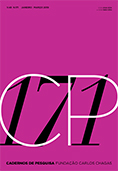Abductive reasoning: a contribution to knowledge creation in education
Keywords:
epistemology, research, knowledge, methodologyAbstract
Based on an epistemological discussion, this paper aims to show the contribution of abduction as a scientific procedure in the educational field. To that end, I explain how scientific research approaches and processes are founded on the three types of logical inference: deduction,
induction and abduction, all of which underpin knowledge building and the role of both science and researchers. Firstly, I describe the specific features of abduction according to Peirce’s philosophical system. Then, I illustrate its implementation in a study on teaching. Finally, I underscore how abduction could contribute to build a broader scientific project in the intercept between basic and praxeological research.
Downloads
References
ADURIZ-BRAVO, Agustín. ¿Qué naturaleza de las ciencias hemos de saber los profesores de ciencias? Una cuestión actual de la investigación en didáctica. Tecné, Episteme y Didaxis, Bogotá, Número Extra, p. 23-33, 2005. (2º Congreso sobre Formación de Profesores de Ciencias).
ALISEDA, Atocha. La abducción como cambio epistémico: C. S. Peirce y las teorías epistémicas en inteligencia artificial. Analogía, v. 12, n. 1, p. 125-144, 1998.
ANADON, Marta; GUILLEMETTE, François. La recherche qualitative est-elle nécessairement inductive? Recherches Qualitatives, n. 5, p. 26-37, 2007.
ARISTOTE. Les premiers analitiques (Organon) III. Paris: Vrin, 2001.
ARISTÓTELES. Tratados de lógica (Organón) II. Madrid: Gredos, 1995.
BRYANT, Anthony. Re-grounding grounded theory. Journal of Information Technology Theory and Application, v. 4, n. 1, p. 25-42, 2002.
CLOT, Yves; LEPLAT, Jacques. La méthode clinique en ergonomie et en psychologie du travail. Le Travail Humain, n. 68, p. 289-316, 2005.
DAVID, Albert. Logique, épistémologie et méthodologie en sciences de gestion. In Conférence Internationale de l’AIMS, Chatenay, May 1999.
DELEDALLE, Gérald. Lire Peirce aujourd’hui. Bruxelles: De Boeck, 1990.
DILTHEY, Wilhelm. Critique de la raison historique: introduction aux sciences de l’esprit et autres textes (Oeuvres 1). Paris: Editions du Cerf, 1992.
ECO, Umberto. Cuernos, cascos, zapatos: algunas hipótesis sobre tres tipos de abducción. En: ECO, Umberto; SEBEOK, Thomas A. (dir.). El signo de los tres: Dupin, Holmes, Peirce. Barcelona: Lumen, 1989.
ECO, Umberto. Semiótica y filosofía del lenguaje. Barcelona: Lumen, 1990.
FAVERGE, Jean-Marie. La démarche clinique en psychologie industrielle. Bulletin de Psychologie, n. 270, p. 904-907, 1968.
GAUTHIER, Benoît. Recherche sociale. Québec: Presses Universitaires de Québec, 1986.
GÉNOVA, Gonzalo. Charles S. Peirce: la lógica del descubrimiento. Navarra: Universidad de Navarra, 1996. (Cuadernos de Anuario Filosofico, 45).
GLASER, Barney; STRAUSS, Anselm. The discovery of grounded theory. Chicago: Adline, 1967.
GUILLEMETTE, François. L’approche de la Grounded Theory, pour innover? Recherches Qualitatives, v. 1, n. 26, p. 32-50, 2006.
KANT, Emmanuel. Critique de la raison pure. Paris: PUF, 2001.
KOLAKOWSKI, Leszek. La filosofía positiva. Madrid: Cátedra, 1966.
MARCEL, Jean-François; NUNEZ MOSCOSO, Javier. La figura del investigador-ciudadano: hacia un (re)encuentro con el ethos de la investigación en educación. Revista Estudios Cooperativos, v. 17, n. 1-2, p. 101-121, 2012.
MORIN, Edgar. La méthode. Paris: Seuil, 2008. V. 1 e 2.
NUNEZ MOSCOSO, Javier. Fronteras del saber científico: reflexión epistemológica sobre las investigaciones fundamentales y praxeológicas en las ciencias de la educación en torno al trabajo docente. Redes de conocimiento: Génesis de enlaces y modalidades interdisciplinarias de cooperación social y científica, v. 1, n. 4, p. 13-26, 2012.
PEIRCE, Charles Sanders. Collected papers of Charles Sanders Peirce. Cambridge: Harvard University Press, 1965.
PEIRCE, Charles Sanders. Pragmatisme et pragmaticisme. Paris: Editions du Cerf, 2002.
PEIRCE, Charles Sanders. Ecrits logiques. Paris: Editions du Cerf, 2006. V. 3.
POPPER, Karl. La logique de la découverte scientifique. Paris: Payot, 2007.
QUINE, Willard. Méthodes de logique. Paris: Armand Colin, 1973.
RAYMOND, Emilie. La Teorización Anclada (Grounded Theory) como Método de Investigación en Ciencias Sociales: en la encrucijada de dos paradigmas. Cinta de Moebio, n. 23, p. 1-11, 2005.
REILLY, Francis E. Charles Peirce’s Theory of Scientific Method. New York: Fordham University Press, 1970.
RODRÍGUEZ, Rodolfo. Abducción en el contexto del descubrimiento científico. Revista de Filosofía de la Universidad de Costa Rica, v. 43, n. 109/110, p. 87-97, mayo/dic. 2005.
SOTO, Cristian. Peirce. Abducción sive lógica sive ontología: acerca del pragmatismo-realismo de nuestras creencias. Grupo de Estudios Peirceanos de la Universidad de Navarra, nobiembre, 2005.
TARDIF, Maurice; LESSARD, Claude. Le travail enseignant au quotidien: expérience, interactions humaines et dilemmes professionnels. Bruxelles: De Boeck, 1999.
WEICK, Karl. Theory construction as disciplined imagination. The Academy of Management Review, v. 14, n. 4, p. 516-531, 1989.
WEISSER, Marc. Expliquer/comprendre: quel paradigme épistémologique pour les sciences de l’éducation plurielles. 8e Biennale de l'éducation et de la formation, avril, 2006.
Downloads
Published
How to Cite
Issue
Section
License
Copyright (c) 2019 Cadernos de Pesquisa

This work is licensed under a Creative Commons Attribution-NonCommercial 4.0 International License.
Authors who publish in this journal agree to the following terms:
a. Authors retain the copyright and grant the journal the right to first publication, with the paper simultaneously licensed under the Creative Commons Attribution license that allows the sharing of the paper with acknowledgment of authorship and initial publication in this journal.
b. Authors are authorized to assume additional contracts separately, for non-exclusive distribution of the version of the paper published in this journal (for example publishing in institutional repository or as a book chapter), with acknowledgment of authorship and initial publication in this journal.
c. Authors are allowed and encouraged to publish and distribute their paper on-line (for example in institutional repositories or on their personal page) at any moment before or during the editorial process, as this can generate productive changes, as well as increase the impact and citation of the published paper (See The Effect of Open Access).









